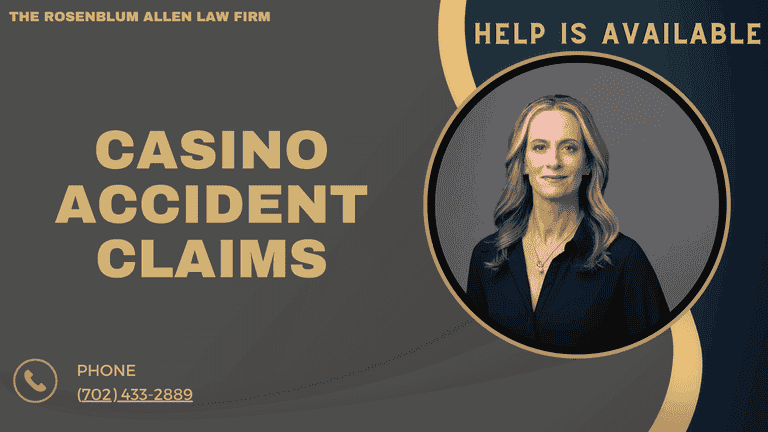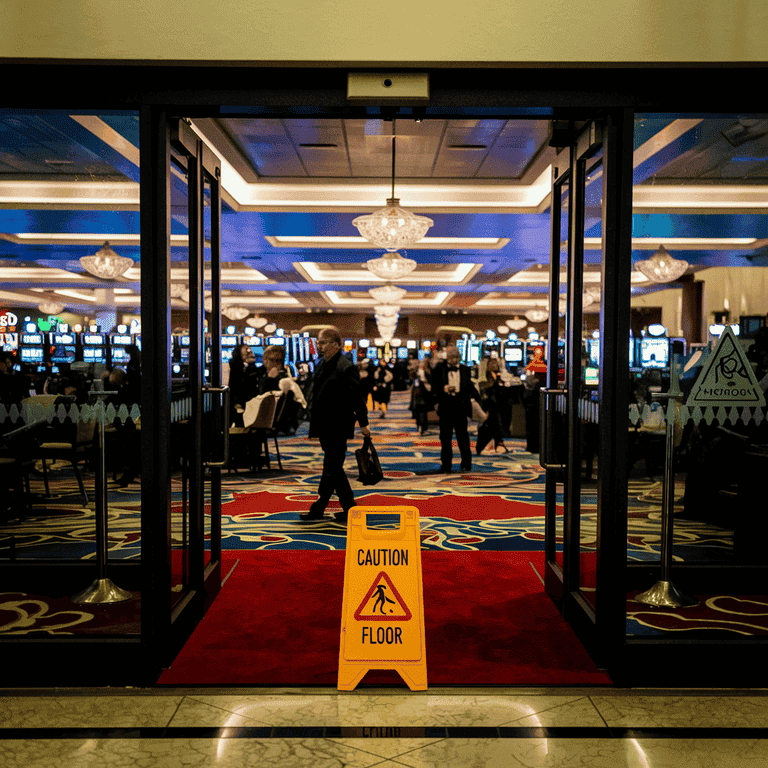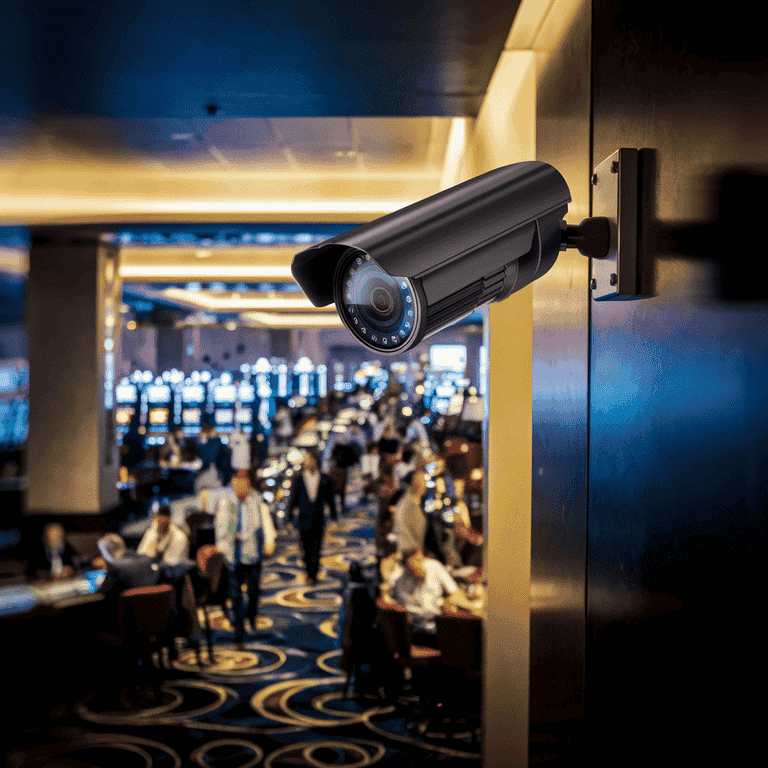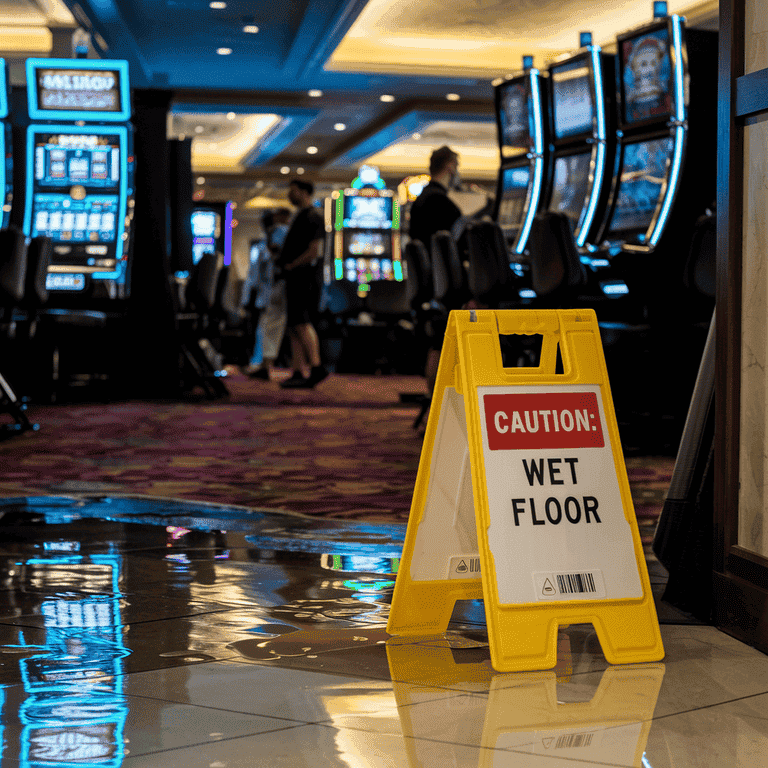Casinos are bustling places full of entertainment, but they also come with their risks. Visitors to casinos can find themselves in hazardous situations, from slippery floors to security lapses. If you experience an accident in a casino, understanding casino accident claims is crucial to protecting your rights and getting the compensation you deserve. Let’s dive into what these claims are and how they work.

What Are Casino Accident Claims?
Casino accident claims refer to legal claims that visitors can file if injured due to unsafe conditions or negligence at a casino. These claims typically fall under premises liability laws, which hold property owners accountable for maintaining a safe environment for visitors. While this is similar to accidents in other public places, casinos pose unique challenges due to their size, large crowds, and diverse operations.
How Premises Liability Laws Apply to Casinos
Casinos, like all property owners, are required by law to exercise a duty of care to keep their premises safe. This means they must take reasonable steps to prevent injuries. For example, if a casino fails to clean up spills or fix broken furniture promptly, and you get injured, you may have grounds for a claim.
Casinos are also unique due to their multi-faceted nature, involving hotels, restaurants, gaming areas, and entertainment venues. As a result, different rules and responsibilities apply depending on where and how an accident occurs.
Why Casino Accident Claims Are Different
In addition to the complexity of the premises, casinos are typically owned by large corporations with experienced legal teams and insurance companies ready to fight claims. Navigating these claims requires knowledge of the specific legal requirements for gambling establishments. A skilled attorney can help you sort through these complexities and establish liability effectively.
Types of Casino Accidents
Accidents in casinos can occur in many different ways. Here are some common types:
Slip and Fall Accidents
These are the most common accidents in casinos. Slip and fall incidents might happen due to:
- Spilled drinks or food left on the floor
- Uneven or torn carpeting in hallways or gaming areas
- Poor lighting in stairwells or parking lots
Casinos are responsible for ensuring that these hazards are identified and resolved promptly. If they fail to do so, they may be held liable for resulting injuries.
Parking Lot and Valet Accidents
Parking lots and valet services present their own set of risks. Visitors may encounter:
- Inadequate lighting leads to trips, falls, or even security risks
- Poorly maintained surfaces with cracks, potholes, or slippery conditions
- Collisions involving valet attendants or other visitors
Ensuring proper lighting and safety protocols in parking areas is a crucial responsibility for casino operators.
Food Poisoning and Contaminated Food Claims
Casinos often feature buffets and restaurants where food safety is critical. Foodborne illnesses can occur due to:
- Contaminated food not being stored, prepared, or cooked correctly
- Unhygienic practices by restaurant or kitchen staff
In these cases, you must document symptoms and seek medical attention promptly. If you suspect food poisoning, you should also report it to the casino management.
Assaults and Security-Related Incidents
Casinos are responsible for providing adequate security for guests. If you’re injured due to:
- Lack of security in areas prone to assaults or thefts
- Inadequate crowd control in high-traffic areas
You may have a case against the casino for failing to provide a safe environment. Security cameras, witness accounts, and prior incident records can play a significant role in these cases.
Equipment or Furniture Malfunctions
Many casinos feature elaborate decor, gaming equipment, and furniture. Hazards can arise if:
- Slot machines or other gaming equipment malfunction or fall over
- Furniture breaks unexpectedly due to wear and tear or poor maintenance
Documenting the incident and taking photos of faulty equipment can help support your claim.

Establishing Liability in Casino Accident Claims
Duty of Care Owed by Casinos
Casinos owe a legal duty of care to their guests. This means taking reasonable precautions to keep all areas safe and addressing hazards promptly. Whether it’s ensuring floors are dry or that security staff are adequately trained, these responsibilities are part of the casino’s duty of care.
Common Breaches of Duty in Casino Environments
Breaches of this duty can include:
- Failure to address known hazards like wet floors or broken furniture
- Negligence in hiring or training security staff
- Inadequate maintenance and inspections
When these failures occur, they can create the basis for a casino accident claim.
Gathering Evidence of Negligence
Evidence is crucial in proving negligence. Some key types of evidence include:
- CCTV footage showing the accident and the conditions leading to it
- Witness statements from other guests or casino employees
- Maintenance records indicating whether regular inspections were carried out
Gathering evidence promptly is essential to making a solid claim.
Steps to Take After a Casino Accident
Experiencing an accident at a casino can be overwhelming. It’s easy to feel unsure about what to do next, especially if you’ve suffered an injury. However, your actions in these moments can significantly impact your ability to file a successful claim later. Here’s what you should do immediately after an accident in a casino.
Seek Medical Attention
Your health and safety should always be your top priority. Even if you initially feel okay, some injuries may not be apparent immediately. Seek medical attention as soon as possible to:
- Identify hidden injuries: Conditions like concussions or internal injuries might not show symptoms immediately.
- Document your injuries: Having medical records that detail your injuries helps strengthen your claim later.
Report the Incident to Casino Management
After getting medical help, report the incident to the casino’s management. When doing so:
- Ask for an incident report: Casinos should document all accidents on their property. Request a copy of this report for your records.
- Provide factual details: Describe what happened without speculating or admitting fault.
Gather Evidence at the Scene
Collecting evidence at the scene is crucial. It can help paint a clearer picture of what happened. Make sure to:
- Take photos and videos: Capture the accident scene, any hazards, and your injuries.
- Get contact information: If there were any witnesses, ask for their names and phone numbers. Their statements can be vital later.
- Note relevant details: Write down anything significant, such as the condition of the floor and lighting or if any warning signs were missing.
Contact an Experienced Attorney
Navigating casino accident claims can be tricky without legal guidance. An attorney who understands premises liability laws can:
- Review your case: Determine if you have a valid claim and assess your damages.
- Communicate with the casino’s legal team: Handle discussions with the casino’s insurance and attorneys on your behalf.
- Build a solid case: Collect the necessary evidence, interview witnesses, and help you understand your rights.

Determining Liability in Casino Accident Claims
Establishing liability is at the heart of any successful accident claim. To do this, it’s essential to understand the legal concepts at play and how they relate to your situation.
What Is Premises Liability?
Premises liability refers to the legal responsibility of property owners to maintain a safe environment for visitors. If a casino fails to meet this responsibility, it may be held liable for any resulting injuries.
In casino accident claims, premises liability applies if:
- The casino was aware or should have been aware of a hazard.
- The casino failed to fix or warn visitors about the hazard in a reasonable amount of time.
Proving Negligence in a Casino Accident Claim
To successfully claim compensation, you must demonstrate that the casino was negligent. This involves proving four elements:
- Duty of care: The casino had a legal duty to keep its premises safe.
- Breach of duty: The casino failed to uphold this duty by neglecting hazards.
- Causation: The casino’s failure directly caused your injuries.
- Damages: You suffered measurable losses, such as medical expenses or lost wages.
Common Defenses Used by Casinos
Casinos and their insurers often use specific defenses to deny liability. Understanding these defenses can help you prepare a stronger case. Some common defenses include:
- Comparative negligence: Claiming that you were partially at fault for the accident. For instance, if you were distracted or ignored warning signs.
- Open and obvious hazard: Arguing that the hazard was so apparent that you should have avoided it.
A skilled attorney can counter these defenses by focusing on the casino’s responsibility to ensure safety.
Potential Damages in Casino Accident Claims
When you’re injured at a casino, the impact on your life can extend beyond physical pain. A successful casino accident claim can help you recover various types of damages, including compensation for:
- Medical expenses: This includes emergency room visits, surgeries, medications, and ongoing treatment.
- Lost wages: If you cannot work due to your injury, you can claim compensation for lost income.
- Pain and suffering refers to the physical and emotional distress caused by the injury.
- Property damage: If any of your personal belongings were damaged in the accident, such as a broken phone, you may be eligible for compensation.
Punitive Damages
In some cases, courts may award punitive damages. These are meant to punish the casino for particularly reckless or egregious behavior. While not common, punitive damages can be significant.
Navigating the Casino’s Insurance Policies
Most casinos carry comprehensive insurance policies to cover various risks. However, dealing with their insurance can be challenging, mainly when they aim to minimize payouts.
Understanding the Casino’s Insurance Coverage
Casinos usually have general liability insurance and may have specific policies for incidents like:
- Slip and falls
- Security-related issues
- Food poisoning incidents
How Insurance Adjusters Approach Claims
It’s essential to be cautious when communicating with insurance adjusters. They often look for ways to reduce the casino’s liability. For example, they may:
- Ask leading questions designed to make you admit partial fault.
- Offer low initial settlements, hoping you’ll accept without fully understanding your rights.
To protect yourself, having your attorney handle these communications is wise.

Filing a Casino Accident Claim: Steps to Take
After understanding liability and potential damages, the next step is to know how to actually file a claim. This process requires careful attention to detail and adherence to specific procedures to maximize your chances of a successful outcome.
Step 1: Document the Incident Thoroughly
Start by gathering all the documentation related to your accident. This includes:
- Incident Report: A copy of the report filed with the casino’s management.
- Medical Records: Comprehensive records detailing the nature and extent of your injuries.
- Photographs and Videos: Clear images of the accident scene, your injuries, and any contributing hazards.
- Witness Statements: Contact information and written statements from witnesses, if possible.
Step 2: Notify the Casino and Their Insurance Provider
Once you have gathered your documentation, inform the casino about your intention to file a claim. This can be done through:
- A formal letter was sent to the casino’s management outlining your injuries and the details of the accident.
- Contacting their insurance company: If you have this information, reach out to start the claim process.
Be cautious when communicating with their insurance representatives. They may try to downplay your injuries or imply that you were at fault. Always consult with an attorney before making statements.
Step 3: Consult an Experienced Personal Injury Lawyer
Navigating casino accident claims without legal guidance can be daunting. Having a skilled attorney by your side can:
- Advise you on your rights and legal options.
- Handle negotiations with the casino and insurance company.
- Help you gather additional evidence if necessary.
Step 4: File Your Insurance Claim
Your lawyer can help you file a comprehensive claim with all the required documentation. The claim should include:
- Details of the accident: Where and when, what caused it, and the resulting injuries.
- Proof of negligence: Evidence showing that the casino failed to uphold its duty of care.
- Your medical records and any other expenses related to the accident.
Step 5: Negotiate a Fair Settlement
After submitting your claim, the casino’s insurance company will review it. They may make an initial offer, but it’s rarely the amount you deserve. Your attorney will negotiate on your behalf to:
- Ensure that all your damages are covered.
- Push for a settlement that fairly compensates you for your pain, suffering, and losses.
If negotiations don’t result in a satisfactory offer, your lawyer may recommend moving forward with a lawsuit.
When to Consider Filing a Lawsuit
While most casino accident claims are settled through negotiation, there are situations where pursuing a lawsuit is the best course of action.
Situations That May Require a Lawsuit
You might need to file a lawsuit if:
- The casino or its insurer denies liability for your injuries.
- The settlement offer is significantly lower than what you believe you deserve.
- There’s a dispute about the extent of your injuries or the cause of the accident.
The Legal Process for a Casino Accident Lawsuit
Filing a lawsuit involves several steps. Here’s what you can expect:
- Filing the Complaint: Your attorney drafts and files a legal document called a complaint outlining your claims against the casino.
- Discovery Phase: Both parties exchange information and evidence related to the case. This includes witness depositions and expert testimony.
- Pre-Trial Negotiations: Sometimes, a settlement can be reached after discovery, avoiding a full trial.
- Trial: If no agreement is reached, the case goes to trial, where both sides present their arguments to a judge or jury.
Statute of Limitations for Casino Accident Claims
It’s essential to remember that there are legal deadlines for filing claims. These are known as statutes of limitations. In Nevada, the statute of limitations for personal injury cases, including casino accident claims, is typically two years. Missing this deadline can mean losing your right to seek compensation.

Common Types of Casino Injuries and Claims
Accidents in casinos can result in various types of injuries. Understanding these common accidents and the associated claims can help you recognize if your situation qualifies.
Slip and Fall Accidents
Slips and falls are the most common casino-related accidents. They can occur due to:
- Wet or uneven floors
- Loose carpeting
- Poor lighting
- Spilled drinks or food
Security-Related Incidents
Casinos often employ security personnel to protect patrons. However, inadequate security measures can lead to injuries. This includes:
- Physical assaults by other patrons or security personnel
- Negligent security that fails to prevent crimes like theft or harassment
Food Poisoning and Contaminated Drinks
Casinos frequently offer dining services, and sometimes, this can lead to:
- Foodborne illnesses due to poor hygiene practices in the kitchen
- Contaminated drinks cause gastrointestinal issues or allergic reactions
Elevator and Escalator Accidents
With many casinos in multi-story buildings, malfunctioning elevators and escalators pose visitor risks. Common claims include:
- Falls or entrapments due to mechanical failures
- Poorly maintained equipment leading to sudden stops or jolts

Breaking It All Down
Casino accident claims can be complex, but you can navigate them successfully with the proper knowledge and legal support. Act swiftly after an accident, gathering the necessary evidence, and consulting a skilled attorney is crucial. Whether you’re dealing with a slip-and-fall, a security incident, or another injury, knowing your rights and the steps to take can help you secure the compensation you deserve.

Frequently Asked Questions
How long do casino accident claims usually take to resolve?
The length of time it takes to resolve a casino accident claim varies based on factors such as the complexity of the case, the willingness of the casino’s insurer to negotiate, and the extent of the injuries involved. Simple cases may resolve in a few months, while others may take over a year, especially if a lawsuit is filed.
What if I was partially at fault for the accident?
Nevada follows a modified comparative negligence rule, which means you can still recover damages even if you were partially at fault if your share of the fault is less than 50%. However, your compensation will be reduced by the percentage of your fault.
How can I prove the casino was responsible for my injury?
Proving the casino’s responsibility involves gathering evidence that shows the casino was negligent. This could include incident reports, surveillance footage, witness statements, photographs of the hazardous condition, and expert testimony. An attorney can help you collect and organize this evidence effectively.
Are there any limitations on the amount I can recover in a casino accident claim?
There are no specific damage caps on casino accident claims in Nevada for most personal injury cases. However, certain factors, like your degree of fault, the severity of your injuries, and the type of compensation you seek, can impact the final settlement or judgment amount.
Should I accept the first settlement offer from the casino's insurance company?
It is generally not advisable to accept the first offer without consulting an experienced personal injury attorney. Insurance companies often offer lower settlements initially to save costs. An attorney can help evaluate whether the offer is fair or negotiate a higher amount.
What costs are involved in pursuing a casino accident claim?
Most personal injury attorneys work on a contingency fee basis, meaning they only get paid if you win your case or secure a settlement. Legal fees are usually a percentage of your final settlement. Other costs may include medical expenses and fees for expert witnesses if the case goes to trial.
Can I still file a claim if the casino incident happened a while ago?
The statute of limitations for personal injury claims in Nevada is typically two years from the accident date. It’s essential to file your claim within this time frame, or you risk losing your right to seek compensation.
What should I do if the casino denies liability for my injuries?
If the casino denies liability, it’s essential to have a personal injury attorney review your case. An attorney can help gather additional evidence to strengthen your claim and negotiate. They can advise you on the next steps, such as filing a lawsuit if necessary.
Can I handle a casino accident claim without an attorney?
While handling a claim alone is possible, it’s not recommended. Casinos and their insurers often have experienced legal teams, making it challenging for individuals to negotiate fair settlements without legal knowledge. An attorney can increase your chances of receiving adequate compensation.
Do all casino accident cases end up in court?
No, most cases are settled out of court through negotiation. However, going to court may be necessary if the insurance company refuses to offer a fair settlement or denies your claim. Based on your case’s specifics, your attorney can help you decide if a lawsuit is the right course of action.

Additional Resources for You from The Rosenblum Allen Law Firm.
Whether you’ve been in a car accident, a work-related incident, or are dealing with the aftermath of a wrongful death, check out these valuable resources:
- Las Vegas Uber & Lyft Accident Lawyer – For those injured in rideshare-related incidents.
- Las Vegas Personal Injury Attorney – Comprehensive legal support for various personal injury cases, including auto accidents, premises liability, and medical malpractice.
- Las Vegas Bicycle Accident Lawyer – Resources for individuals injured in bicycle-related accidents.
- Big Rig Accident Lawyer – Support and guidance for victims of truck-related accidents.
- Las Vegas Car Accident Attorney – Information on handling car accidents and pursuing rightful compensation.
- Las Vegas Slip & Fall Attorney – Understanding your rights after a slip and fall incident.
- Wrongful Death Lawyer in Las Vegas – Help for families dealing with the tragic loss of a loved one.
Explore these resources to gain clarity on your situation and find the information you need to move forward confidently.

Offsite Resources for You
American Bar Association (ABA) – American Bar Association offers extensive information on legal standards, premises liability, and personal injury law. It’s a valuable resource for understanding legal concepts and finding reputable lawyers.
National Safety Council (NSC) – National Safety Council provides resources on accident prevention and safety standards. Their materials can help readers understand common causes of slip and fall accidents and how they are prevented.
Occupational Safety and Health Administration (OSHA) – OSHA is a key resource for understanding workplace safety standards, especially if injuries occurred in areas maintained by staff. It’s also valuable for insight into general premises safety obligations.
Centers for Disease Control and Prevention (CDC) – CDC offers detailed information on common injury statistics, causes, and preventative measures. Their resources on slip and fall injuries and foodborne illnesses can provide useful background for claims involving casinos.
National Floor Safety Institute (NFSI) – National Floor Safety Institute specializes in slip and fall prevention research and safety standards. Their resources help explain what constitutes a hazardous floor condition and casino responsibilities.
Expert Institute – Expert Institute connects attorneys with expert witnesses, including those specializing in premises liability and personal injury. This is useful for those needing expert opinions to strengthen their casino accident claims.
Insurance Information Institute (III) – Insurance Information Institute provides insights on how insurance works, including liability coverage for businesses. It helps readers understand the role of insurance companies in settling claims.

A Special Message from Our Lead Attorney, Molly Rosenblum Allen, Esq

Hello, this is Molly. Thank you for taking the time to explore these valuable resources. I hope you found the information helpful as you consider your next steps. If you’re facing a challenging situation and need experienced legal guidance, my team and I are ready to help. Call us at (702) 433-2889, and let’s get the ball rolling on your case. We’re here to listen, support, and fight for your desired results.
Talk soon,
Molly Rosenblum Allen





